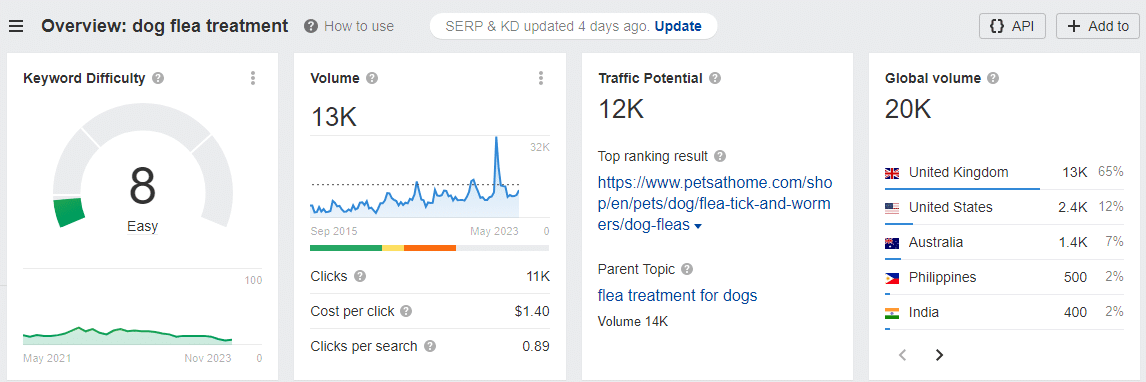In the ever-evolving realm of online marketing and SEO, a foundation of critical importance is keyword research. Picture it as the compass guiding your way through the vast landscape of search engines and the digital domain. Without a doubt, it’s the cornerstone of any SEO and SEM marketing campaign, serving as the North Star for businesses on the internet.
But why is keyword research so vital, you may wonder? In this comprehensive guide, we’re going to explore precisely that. We’ll explore the key reasons why keyword research plays a pivotal role in SEO and content marketing. By the end of this article, you’ll not only grasp its immense significance, but you’ll also gain access to potent keyword research tips to enhance your strategies significantly.
Imagine it as deciphering the secret language of search engines and your potential audience. Keyword research enables you to uncover those magic words and phrases that bridge the gap between your content and the questions, needs, and desires of your target audience. With every search query typed into Google, a world of possibilities and connections is created. We’re here to help you unlock those opportunities and harness them to your advantage.
What is Keyword Research?
Keyword research is the process of identifying and selecting specific words or phrases (keywords) that people commonly use when searching on search engines, like Google. This practice is essential in SEO to optimise online content for better visibility and relevance in search engine results.
Why Keyword Research Is a Game Changer in SEO?
Want to know why keyword research is important? Well, it’s important for several compelling reasons. Let’s dive into the main ones, shall we?
Not All Keywords Are Created Equal
Selecting the right keywords is like choosing the perfect ingredients for a delicious recipe. In the world of SEO, ‘good’ keywords are those that share some special qualities:
- They’re highly relevant to your content.
- They come with a decent search volume.
- They face less competition.
While it might not always be a piece of cake to find keywords that check all three boxes, that should be your goal whenever possible. Good keywords are the secret sauce for optimizing your web content. They work like magic, helping your website climb the ranks on search engine results pages and drawing more organic traffic to your online space.
Want an example? Imagine you’re offering, let’s say, a plumbing service. “Good Keywords” would be something like:
1. “Plumbers Near Me” — This keyword is specific, indicates strong intent, and targets local searches, making it a good choice for a plumbing business.
2. “Best Residential Plumbing Services” — It combines quality and service, attracting users looking for top-tier plumbing solutions.
3. “Clogged Drain Repair Expert” — This keyword is highly relevant and highlights expertise, which is valuable in this niche.
4. “Affordable Toilet Leak Fix” — It combines affordability and a specific issue, making it an attractive choice for budget-conscious customers.
5. “24/7 Plumbing Services” — This keyword targets people in need of round-the-clock assistance, a common requirement in plumbing.
On the other hand, “Bad Keywords” would look like this:
1. “Water” — This keyword is too broad and doesn’t specify any plumbing services, making it less likely to attract relevant traffic.
2. “How to Fix a Leak” — While it relates to plumbing, it’s more of an informational query than a potential lead for a plumber.
3. “Buy” Plumbing Tools” — This keyword is unrelated to plumbing services, and you wouldn’t want to target users looking to purchase tools.
4. “Funny Plumbing Videos” — It’s irrelevant and unlikely to attract users in need of plumbing services.
5. “Plumbing History” — This keyword focuses on the history of plumbing, which doesn’t align with a plumbing business’s goals.
The end goal here is to choose keywords that are specific, intent-driven, and related to the services you provide to effectively attract potential customers.
Using Competition in Your Favour
Keyword research plays a crucial role in understanding where your competition excels. Let’s say you have a removal company. By conducting keyword research, you can uncover the keywords that your competitors are targeting in their content. For instance, if you run a removal company in Bristol, you might find that one of your competitors is ranking well for keywords like “Bristol house removals” or “reliable Bristol removal services.” This insight allows you to assess which keywords are driving traffic to your competitors and where you might need to compete.
Keyword research tools can help you analyse your competitors’ rankings for specific keywords. If you find that a competitor is consistently ranking in the top positions for important keywords like “London office removals,” you can examine their content and SEO strategies to understand why they’re successful. This information can inform your content and optimization efforts.
Additionally, through keyword research, you can identify keywords that your competitors may have overlooked. For instance, you might uncover that there’s a significant search volume for “eco-friendly house removals,” but none of your competitors are targeting this keyword. This presents an opportunity for you to create content around this keyword and capture a niche market.
By regularly monitoring your competitors’ keyword strategies, you can stay informed about any shifts in their SEO approach. For example, if a competitor starts targeting new keywords related to “secure storage solutions,” it might indicate a response to changing customer preferences, and you can adapt your strategy accordingly.
In summary, keyword research empowers you to not only understand what your competitors are doing in the SEO space, but also to identify opportunities to outperform them and capture a larger share of the market in your industry.
Better Use of Resources
SEO keyword research is essential for better budget allocation, as it helps you identify high-performing keywords that can maximize your return on investment. By focusing your budget on keywords that align with your business goals and customer intent, you can make more efficient use of your resources. Let’s consider an example for a veterinary blog:
Suppose you run a veterinary blog offering information on pet care, including services like flea treatments, vaccinations, and dental care for pets. To allocate your budget effectively, you need to conduct SEO keyword research to identify valuable keywords related to your content.
In this case, you might find keywords like “dog flea treatment,” “cat vaccinations,” and “pet dental care tips.” You need to analyse these keywords to understand their search volume, competition, and user intent. For instance, you find that “dog flea treatment” has high search volume, moderate competition, and indicates strong user intent.

This is a powerful insight! With this information, you can allocate a significant portion of your budget to content creation and promotion focused on “dog flea treatment.” Since it has strong user intent, ranking for this keyword is likely to drive high-quality traffic to your blog.
By allocating a substantial part of your budget to the right keyword, you optimize your resources for the most valuable and relevant content. This targeted approach ensures that you capture the attention of your audience, resulting in better budget allocation and improved ROI for every pound you spend.
Trends and Seasonality
Keyword research can be a powerful tool for identifying seasonality and trends, particularly for e-commerce businesses seeking to target winning products for various seasons and trends.
Imagine you operate an e-commerce store that offers a range of products, including clothing, electronics, and outdoor equipment. Your goal is to ensure that your product offerings align with seasonal demand and current trends. Keyword research, coupled with tools like Google Trends, can guide your product selection strategy.
Let’s consider the upcoming holiday season. To identify which products are in high demand, you can utilise keyword research tools to discover relevant keywords that experience a surge in popularity during this period. For example, you might uncover keywords like “holiday gifts,” “Christmas decorations,” and “winter coats,” which witness a substantial increase in search volume starting in October and peaking in December.

Equipped with this valuable information, you can stock up on holiday-related products well in advance and ensure they receive prominent placement on your e-commerce website as the season approaches. This strategy enhances your prospects of attracting holiday shoppers and boosting sales.
To remain current and offer products that align with the latest trends, you can employ keyword research in conjunction with SEO analytics tools. Suppose you observe a growing trend in keywords related to “smart home gadgets” and “sustainable products.” Google Trends reveals a consistent rise in search volume for these terms.
By identifying this emerging trend, you can assemble a selection of smart home devices and environmentally friendly products, making sure they are prominently presented on your e-commerce platform.
By incorporating keyword research and insights from tools like Google Trends and other SEO resources, you can make data-driven choices concerning which products to highlight, promote, and, crucially, when to do so. This method allows you to fine-tune your SEO strategy for seasonal and trend-driven success, maintain a competitive edge, enhance your online visibility, and address the ever-evolving preferences of your target audience.
Keyword Research Tips for Effective SEO
To help you navigate the intricate world of keyword research, we’ve compiled a set of essential tips to supercharge your SEO efforts.
1. Utilise Keyword Silos: Organize your keywords into logical groups or silos. This ensures that your content is structured coherently and enables search engines to better understand the topical relevance of your pages.
2. Focus on Topical Relevance: Beyond individual keywords, pay attention to the broader topics they represent. Search engines increasingly prioritize content that demonstrates topical expertise.
3. Consider Search Volume: Prioritise keywords with substantial search volume. Tools like Ahrefs and SEMrush can provide valuable data on keyword search volume, helping you pinpoint high-potential keywords.
4. Explore Long-Tail Keywords: Long-tail keywords are often less competitive and can attract more specific, motivated traffic. They are essential for niche businesses and bloggers.
5. Understand Search Intent: Diving deep into the user’s search intent is crucial. Are they looking for information, a product, a service, or local solutions? Tailor your content accordingly.
6. Avoid Keyword Cannibalization: Be cautious not to target multiple pages on your website with the same keyword. This can confuse search engines and harm your rankings.
7. Leverage Google Suggest: Google’s autocomplete feature (Google Suggest) can be a goldmine for keyword ideas. Start typing a keyword, and let Google suggest related queries.
8. Explore Ahrefs and SEMrush: Tools like Ahrefs and SEMrush provide in-depth keyword analysis, competition insights, and content gap analysis. They are invaluable for optimizing your SEO strategy.
9. Analyse “People Also Ask”: The “People also ask” section in Google’s search results is a treasure trove of related questions. Address these questions in your content for improved relevance.
Incorporating these recommendations into your keyword research process can greatly improve your SEO strategy. Keep in mind that SEO is a dynamic field, so remaining current with industry trends and adjusting to algorithm changes is crucial for sustained success.
Frequently Asked Questions
1. Can I skip keyword research and create content without it?
While you can create content without keyword research, it’s not advisable. Keyword research helps you create content that is purposeful and aligned with your target audience’s interests. Without it, you might miss opportunities to attract more visitors and rank well in search results.
2. How often should I update my keyword strategy?
Keyword research is an ongoing process. You should periodically review and update your keyword strategy to adapt to changes in search trends, your industry, and your target audience’s preferences. Regularly monitor your website’s performance and make adjustments accordingly.
3. How does keyword research benefit SEO?
Effective keyword research lies at the heart of SEO. By identifying the right keywords, you can optimise your content, meta tags, and other on-page elements, making it simpler for search engines to comprehend your content and rank it for relevant searches.
4. What tools can I use for keyword research?
Numerous keyword research tools are available, including Google Keyword Planner, SEMrush, Ahrefs, and Moz Keyword Explorer. These tools can assist you in discovering relevant keywords, analysing search volume, competition, and generating content ideas.
5. What is the difference between short-tail and long-tail keywords?
Short-tail keywords are concise and generic search terms, often comprising one or two words. Long-tail keywords are more specific, consisting of multiple words. Long-tail keywords usually have lower search volume, but can be highly valuable as they target a more precise audience.
6. Can keyword research help me understand my audience better?
Undoubtedly. Keyword research provides insights into the language and terminology your audience uses when seeking information. This helps you gain a deeper understanding of their pain points, interests, and needs, enabling you to customize your content to their preferences.
Ready to elevate your online presence and dominate search engine rankings? Our SEO services are tailored to enhance your digital visibility, drive targeted traffic, and boost your business growth. Let’s transform your online strategy together. Contact us now for a FREE consultation and take the first step towards SEO success in Liverpool!
Read related articles:

